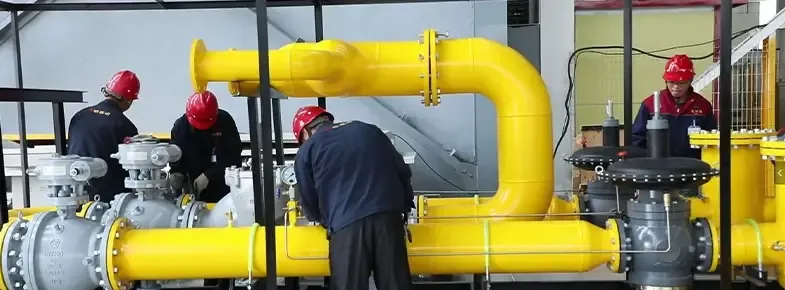
Oct . 11, 2024 19:22
Back to list
Understanding the Function and Importance of Natural Gas Regulators in Energy Distribution
Understanding Natural Gas Regulators
Natural gas is a crucial source of energy, powering homes, industries, and vehicles across the globe. One of the essential components in the distribution and utilization of natural gas is the natural gas regulator. This article aims to explore the function, importance, and types of natural gas regulators in the context of energy distribution and safety.
What is a Natural Gas Regulator?
A natural gas regulator is a mechanical device used to control the pressure of natural gas within a distribution system. When natural gas is extracted from pipelines or storage facilities, it comes at a high pressure. This pressure must be decreased to a usable level for residential and commercial usage. The natural gas regulator ensures that the gas is delivered at a safe and consistent pressure, preventing excess pressure that might lead to dangerous situations, such as leaks or explosions.
How Does a Natural Gas Regulator Work?
The operation of a natural gas regulator is quite simple yet effective. It operates on the principle of pressure differential. The regulator is installed at various points in the distribution system, typically at the service meter or on appliances like furnaces and water heaters. As gas flows through the regulator, the device senses the outlet pressure and adjusts the flow of gas accordingly.
Inside the regulator, there is a diaphragm connected to a spring. When the pressure at the outlet decreases, the diaphragm moves and compresses the spring, opening a valve that allows more gas to flow in. Conversely, if the outlet pressure rises above the preset level, the spring pushes the diaphragm up, closing the valve to reduce the gas flow. This automated process ensures that gas is supplied at a consistent pressure, catering to the demands of the end-user.
Importance of Natural Gas Regulators
Natural gas regulators play a crucial role in ensuring the safety, reliability, and efficiency of gas distribution systems. Their significance can be summarized in several key points
1. Safety The most critical function of a natural gas regulator is to maintain safe operating pressures. High pressure can lead to leaks, which may cause fires or explosions. Regulators mitigate these risks by ensuring that the gas pressure remains within safe limits.
natural gas regulator

2. Efficiency By controlling the gas flow effectively, regulators enhance the efficiency of gas appliances. They help in optimizing the usage of gas which not only saves costs for consumers but also contributes to energy conservation efforts.
3. Consistency Regulators provide a consistent pressure level needed for appliances to function efficiently. Fluctuations in pressure can lead to improper operation of gas-powered equipment, potentially causing malfunctions or damage.
4. Regulatory Compliance Many jurisdictions have regulations in place that mandate the use of regulators in gas distribution systems. Compliance with these regulations is essential for public safety and environmental protection.
Types of Natural Gas Regulators
There are primarily two types of natural gas regulators First-Stage Regulators and Second-Stage Regulators.
1. First-Stage Regulators These are used in the primary distribution system, reducing high pressure from transmission lines to an intermediate pressure. They serve as a critical first step in the pressure reduction process.
2. Second-Stage Regulators These are found closer to the end-user and further reduce the gas pressure to the final delivery level suitable for appliances.
In addition to these, there are also adjustable and non-adjustable regulators, each serving specific applications and requirements.
Conclusion
Natural gas regulators are vital components of the natural gas supply chain, ensuring the safe delivery of gas for heating, cooking, and other uses. Their ability to manage pressure not only protects people and property but also enhances the efficiency of gas utilization. As the demand for natural gas continues to grow, understanding the role of regulators becomes increasingly important for energy professionals, consumers, and policymakers alike. By prioritizing safety and efficiency, we can harness the benefits of natural gas while mitigating associated risks, making regulators a cornerstone of modern energy infrastructure.
Next:
Latest news
-
Safety Valve Spring-Loaded Design Overpressure ProtectionNewsJul.25,2025
-
Precision Voltage Regulator AC5 Accuracy Grade PerformanceNewsJul.25,2025
-
Natural Gas Pressure Regulating Skid Industrial Pipeline ApplicationsNewsJul.25,2025
-
Natural Gas Filter Stainless Steel Mesh Element DesignNewsJul.25,2025
-
Gas Pressure Regulator Valve Direct-Acting Spring-Loaded DesignNewsJul.25,2025
-
Decompression Equipment Multi-Stage Heat Exchange System DesignNewsJul.25,2025

